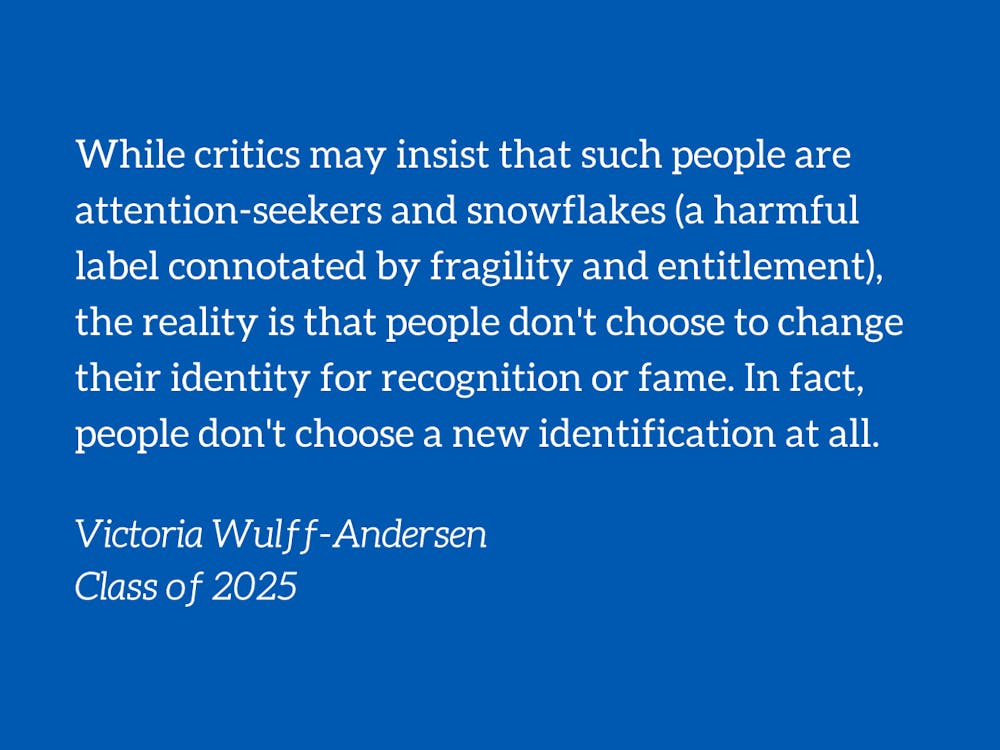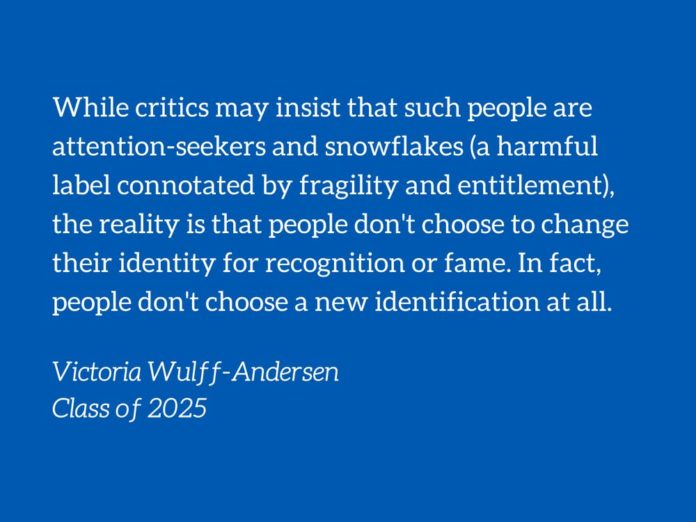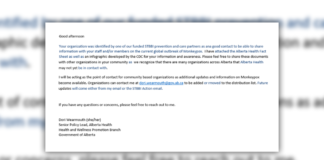
If you were to walk into the Center for Sexual and Gender Diversity here at Duke, you’d probably hear a joke common to the LGBTQ+ community in which an individual will claim to have been “every gender” or “every sexuality under the sun.” The statement is, of course, hyperbolic in nature and meant to poke fun at the ever-shifting course of identity that occurs when queer people undergo a journey of sexual or gender discovery. However, to outsiders of the community, such a joke provokes confusion and contributes to the impression that LGBTQ+ identities are fleeting, choosable and unreal.
It isn’t difficult to see where these misconceptions derive from. When someone, particularly an adolescent, comes out as a certain gender or sexuality, it can already be difficult for others to accept such an uncommon identity (with only 3.8% of Americans naming themselves as LGBTQ+ as per 2017). When that person then reveals that they now are another gender or sexuality, the same group that initially had a hard time accepting the first identity may feel as though they have been lied to, or that this person’s LGBTQ+ identification is just a phase. Coupling this event with general ignorance, society has overall grown to stigmatize the introspective journeys of non-heterosexual and non-cisgender people.
Not all LGBTQ+ persons exhibit changes in their sexual or gender identity. Numerous studies have found that the majority of LGBTQ+ people, particularly women, remain consistent with their orientation and gender over time—exemplified by JP Stokes’s report that 49 percent of the 216 bisexual men in his study claimed no changes in sexual orientation over the years and LM Diamond’s finding that 70% of her 80 non-heterosexual female participants (initially aged 16 to 23 years) maintain the same self-identification after two years.
Still, it’s important to recognize that those who do not remain consistent with their claims to personal gender and sexuality have an LGBTQ+ identity that is just as valid as those who do. While critics may insist that such people are attention-seekers and snowflakes (a harmful label connotated by fragility and entitlement), the reality is that people don’t choose to change their identity for recognition or fame. In fact, people don’t choose a new identification at all. Rather, the true sexual or gender identity for some people may be clouded by a multitude of circumstances that result in a journey of criticized inconsistency.
Coming out is such a difficult process on its own. You need to consider your surroundings, safety and internal beliefs before revealing who you truly believe yourself to be. Propelling the expectation that LGBTQ+ identities must be asserted with 100 percent certainty, that there’s no turning back or rejecting the newly-claimed label, will only add to the mass fear of coming out, particularly when 100 percent certainty cannot be guaranteed with the high percentage of mental health problems obscuring proper introspection on orientation and gender.
LGBTQ individuals are twice as likely as heterosexual men and women to have a mental health disorder in their lifetime. This statistic becomes all the more distressing when the ramifications mental health disorders have on sexual and gender discovery are considered. Many mental health disorders, like anorexia or bulimia nervosa, are correlated with low hormonal levels that can result in decreased sexual attraction, making it all the more difficult to discover one’s sexual orientation. Depression and anxiety can make self-introspection difficult and distressing, detracting from finding the gender and sexuality a person feels most comfortable identifying by.
On top of the prominence of mental health disorders, LGBTQ+ youth also have to deal with the obstacles of maturation and puberty obscuring feelings regarding identity. How can an adolescent or young adult whose brain hasn’t yet fully developed be expected to remain consistent with a label they laid claim to in their journey of self-discovery? How can a young person who hasn’t had the sexual experiences and epiphanies of grown adults be criticized if they grow out of an identification?
Furthermore, security must also be discussed. Over 25.5 percent of members of the LGBTQ+ community have reported experiencing discrimination within their lifetime. With the ostracization and harassment that comes with being any member of the LGBTQ+ community—nonbinary, transgender, gay, lesbian, bisexual or other—some individuals may find that they have to label themselves more “safely” (if they decide to come out as all). If you live in a household where bisexuality isn’t considered real, you may claim to be lesbian or gay to have a sliver of feeling comfortable in their own skin. If you live in a community where being entirely homosexual is considered repulsive, you may identify as bisexual to have an opportunity at being romantically happy.
All of this is particularly important to consider in the context of campus life. Beyond academics and extracurriculars, university is defined by the evolution in your character and discovering who you are as a person. A line for that discovery should not be drawn at your sexual identity and gender identity; in fact, discovering your sexual and gender identity is allowed to be one of the major processes in your college journey. For the queer Blue Devils out there, take the time to self-introspect and allow yourself the kindness to label and re-label and un-label who you are in the LGBTQ+ community. Consult with people at the CSGD, talk with people of a variety of orientations, wear clothing that transcends binariness and just be comfortable in your own skin. For the Blue Devils who are allies, employ the information used in this article to learn how to be a more patient and accepting ally for your friends undergoing their journey of sexual or gender discovery.
Identity is such a crucial part of feeling content in one’s own skin. Being able to describe the way one feels about their gender and who they’re attracted to is an empowering and incredible feeling. LGBTQ+ people should be able to go through the steps necessary to find who they truly recognize themselves as. If the stigma behind the diversity of LGBTQ+ journeys was removed, perhaps more individuals would be able to find relief in showing who they truly are. If the discrimination against changing identities halted, perhaps more people would find bliss within their place at Duke and the world.
Victoria Wullf-Andersen is a Trinity freshman. Her column runs on alternate Mondays.
Get The Chronicle straight to your inbox
Signup for our editorially curated, weekly newsletter. Cancel at any time.








